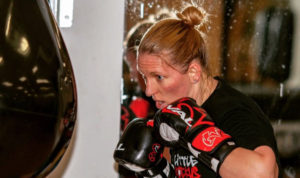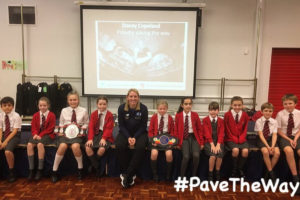Gender equality in sport: Stacey Copeland’s quest to find meaning in retirement
It is a curious truth that retirement is often the most daunting prospect of all for someone who gets punched in the head for a living. That was indeed the mindset of former Commonwealth boxing champion and England footballer Stacey Copeland, who had ‘dreaded’ hanging up her boots, to be later replaced by gloves, from the age of 14.
Her final flourish as a sportswoman came all of 23 years later, defeating Mapule Ngubane to become Britain’s first female Commonwealth champion in Zimbabwe’s far-flung International Convention Centre.
Given that all of her previous professional bouts had taken place in her hometown of Manchester, it was quite a way to round off her career, even if she was unaware that retirement would be forced upon her by injury down the line.

Talking exclusively with Sports Gazette, Copeland recalls the gravity of the occasion: “There was one point building up to the fight when I got an enormous rush of nervous energy, electricity in my veins, a mad stirring sensation in my tummy, I felt nauseous and dizzy.
“That was when I shook myself because I knew that if I was the little girl I was at 11, asking my grandad to box and being told it was illegal, she’d be telling me this was the ultimate dream.”
The then-37-year-old was able to shake off the nerves as she claimed a ten-round unanimous decision victory, but three injury-interrupted training camps later, she was forced to call time on her brief but successful professional career.
For someone who still, by their own admission, had so much more to give from a mental perspective, it was hugely disappointing not to retire on her own terms.
She said: “To tell the truth, it is always something I’ve dreaded. Even at a really young age I remember having that sense of dread and it never left me.
“As I came up to the end of my football and boxing career, that sense of dread built. I tried not to live in that state of mind, I tried to enjoy every minute because I knew the end was coming.
“When I announced it on social media, there was a number of lovely messages which was great, but that night I woke up and felt so ill it was unbelievable. I felt sick, nauseous, light-headed, I think it had really sunk in that it was over and I had no idea how to navigate that.”
Time and time again, we have seen the mental struggles of athletes who had previously poured their whole life, and tailored their mentality towards achieving a specific goal.
Once that carrot is no longer dangled in front of them, the daunting task of reprogramming their entire mindset takes place – a total change of course onto a path that is going to grant them new meaning in life.
Sportsperson or not, staring into that kind of void would be gut-wrenching at the best of times.
In inspired fashion, Copeland used her own personal experiences from a life spent within sport to tackle the issue of gender inequality. Her ‘Pave the Way’ project is the vehicle for this, and she has grown into a captivating public voice on a salient topic within sport.
Pave the Way is an initiative designed to inspire the next generation of females through sharing her own experiences, but also males who face backlash for participating in traditionally ‘female’ activities.
As well as working a part-time job and fulfilling her regular slots on BBC radio shows, Copeland has given presentations in schools and delivered a series of TED talks to this end.

On what motivated her action, she said: “When I was 16 I got my first England call up, it’s just the best feeling in the world.
“I took [the letter] to my boss at the time and his response was ‘you want me to give you a week off to play for a women’s football team?’. I eventually took it off unpaid, but I walked out of that interaction feeling small, feeling like an absolute idiot for thinking it was a big deal to play for the England women’s football team.
“I didn’t have any role models to argue the point with him, I didn’t have a toolkit to challenge what he was saying.”
Those unsavoury incidents occurred right the way through her sporting career, culminating in her Commonwealth title victory not being crowned with a belt because the replicas for female champions had stopped being produced.
An older and wiser Copeland voiced her dissatisfaction to the boxing authorities, who made sure that subsequent female champions had a belt to celebrate with their family and friends.
She said: “That shift in my willingness to speak up came about from years of hearing these things over and over again and having to unlearn all the things told to me by society at large.”
Thankfully, change is coming. To a certain extent, change has always been in progress, but like a tumbling snowball, female boxing and female sport in general is trudging further into the public eye and reaping more of the rewards.
For Copeland, there is understandably a large part of her which regrets missing out on this era of women’s sport, where Irish superstar Katie Taylor reportedly pocketed over £1million for her 2020 rematch with Delfine Persoon.
Still, the Mancunian finds plenty of reason to reflect: “All of us have been part of the growth in popularity, back to Jane Couch in the 1990s who had the battle for us to legalise women’s boxing. Whichever era you look at, every woman has been part of the growth of this sport.
“I’m delighted for the boxers coming through for all nations that the opportunities are now there for them. Each of us has played a role in making things better for the next generation. When that comes, you feel a part of it.
“Watching the boxers at the Olympics and all the support they’ve had makes you feel part of it because we were the ones who were there getting laughed at and mocked when we were the only ones doing it.
“I knew this would happen and there is still so much more to come as the talent is met with opportunities for women.”
Copeland’s post-retirement ventures hope to accomplish exactly that, to encourage the next set of trail blazers within women’s sport who will not take their foot off the gas just because the rewards are steadily growing.
Although hanging up the gloves ended her direct participation in sport, her indirect involvement is alive and kicking, despite the fact her mind would love to still do what her body no longer can.
To hear more of Stacey, her inspiring stories and engaging personality can regularly be heard on BBC Radio Manchester.